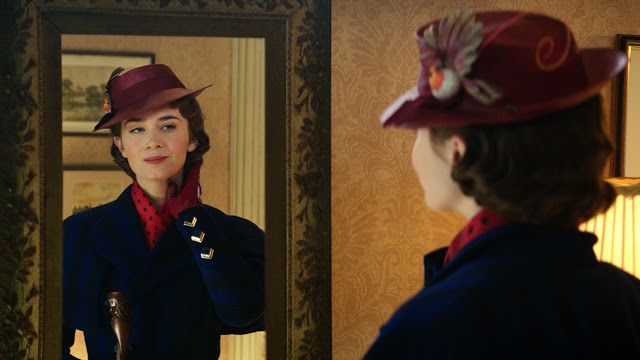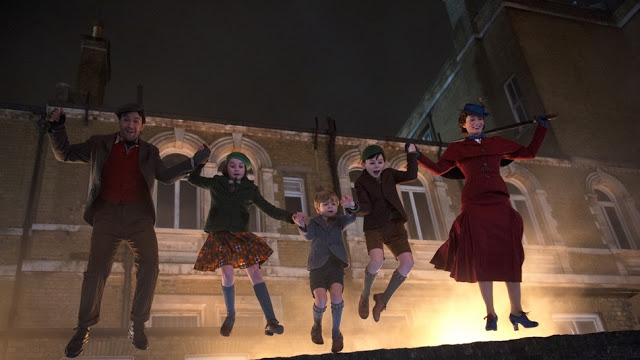The book on Mary Poppins is that she’s practically perfect in every way. Like most movies, Mary Poppins Returns, which returns to the home of the Banks family on Cherry Tree Lane after a 54-year absence, is not perfect; it isn’t even very good. But it is hard to quibble with the rightness of Emily Blunt’s performance as the titular nanny, all withering glares and superior disdain. As a singer, Blunt is no Julie Andrews (who is?), but her perfectly calibrated acidity helps anchor a film that is otherwise so flimsy, it’s prone to drift off into nothingness, sliding up a banister until it disappears into the ether.
Not that Mary Poppins Returns is quiet. Directed by Rob Marshall, who seems to have become the emissary of the new-age Hollywood musical almost by default, it boasts a number of suitably impressive and boisterous numbers, which have been staged with evident care and skill. Yet there is a dispiriting adequacy to Marshall’s choreography, a lack of genuine wonder and flair. The music here is perfectly fine, but it seems unlikely that any of the songs will grow to acquire the classic status of “A Spoonful of Sugar”, or even join the ranks of more recent Disney hits such as “Let It Go” and “You’re Welcome”.
That last one was of course written by Lin-Manuel Miranda, who appears here as Jack, a cheery lamplighter who’s a successor of sorts to Bert, the avuncular Cockney played by Dick Van Dyke in the original. Miranda does quality work, as do Emily Mortimer and Ben Whishaw as the now-grown Banks children; they fit in more gracefully than do Colin Firth and Meryl Streep, who both struggle to modulate their wattage in a film that’s less suited for star power than silliness.
About which: The plot of Mary Poppins Returns is utter nonsense, a race against the (literal) clock that doubles as a fable of hope and perseverance, in which the Bankses must scramble to repay a loan before an evil banker and his hapless minions repossess their home. I could begrudge the film’s narrative inanity, as well as its curious messaging—don’t worry, middle-class families, all you need to do to stave off a recession is hire a magical nanny and also locate a long-buried cache of ancestral wealth!—but I don’t pretend that anyone is interested in this movie for its storyline, or even its mawkish themes, which are designed merely to serve as the sugary topping to a frothy confection of singing and dancing.
Yet this makes me ask a question of Mary Poppins Returns, the same query that the Banks children level in bewilderment at their long-lost caretaker: Why are you here? The movie has no real characters to speak of, and no real story to tell; if Marshall wanted to make a zippy musical, couldn’t he have made a fresh new one, rather than dully rehashing a half-century-old classic? Perhaps I’m being naïve; studios are of course far more willing to bankroll sequels to established properties than to take risks on new ones, relying on the irresistible and profitable pull of nostalgia. (For the record, I had never seen the original Mary Poppins until a few weeks ago, which arguably makes me the least appropriate viewer in the world to critique this follow-up.) But nostalgia alone is a feeble power source, and it can’t spark life into a thoroughly pleasant production that fails to justify its existence. Mary Poppins Returns is hardly a terrible movie—it’s too bright and amiable to be offensive—but in most ways, it’s practically pointless.
Jeremy Beck is the editor-in-chief of MovieManifesto. He watches more movies and television than he probably should.


